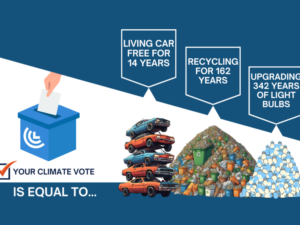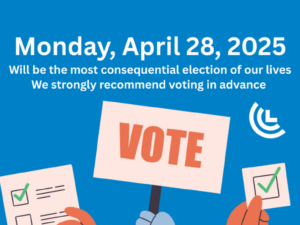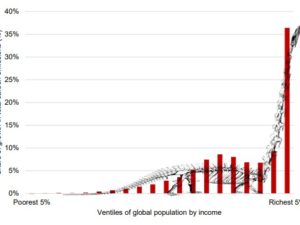Sudbury ON: On Thursday, June 7, 2018, Ontarians will go to the polls. On March 5, Citizens’ Climate Lobby sent a survey to the four major political parties in Ontario regarding their climate change policies. A new study published May 23, 2018, in Nature, found that if the world meets the Paris agreement’s 1.5-degree Celsius rise in temperature target (as compared with a two-degree rise) by 2100, it would be about three percent wealthier or realize about $20 trillion dollars in cumulative benefits. This study aligns with The Stern Review’s projected costs of inaction on global warming, imposed on future generations, as a minimum of five percent of global GDP lost annually by mid-century. Inaction puts the planet in the cross-hairs of coastal flooding, famine, water crisis, mass migration and untold suffering that is preventable if we act adequately on the climate crisis now with an expenditure of one percent of GDP, which will create jobs and the conditions necessary to keep civilization stable. This begs the question: which policies should our governments use to lower our greenhouse gas emissions? Recently, the Pembina Institute launched an online climate policy simulator. The simulator allows the user to assess the effectiveness of individual policies on greenhouse gas emissions from Canada to mid-century. If you remove carbon pricing from the model, the core driver of emissions reduction is gone. The only way to reduce emissions is through a complex series of multiple specific policies within each economic sector which are much more expensive for the taxpayer. After all the policies are activated in the simulator to 100%, one still does not arrive at the same end result for emissions reduction as is the case with carbon pricing in effect. Earlier this year the Environmental Commissioner of Ontario (ECO), Dr. Dianne Saxe released a report on Ontario’s cap and trade program. The report, Ontario’s Climate Act: From Plan to Progress, notes that of the $1.37 billion in projects funded as of November 2017, almost all meets the requirements of The Climate Change Mitigation and Low-carbon Economy Act. “A price on carbon pollution is a crucial tool we need to slow climate change,” said Ontario’s independent environmental watchdog, Dr. Dianne Saxe. For readers unfamiliar with the ECO, the ECO is the province’s environmental watchdog and is appointed by an all-party committee. The ECO is an independent officer of the Ontario Legislature tasked with, among other environmental portfolios, reporting on Ontario’s progress reducing emissions and improving energy conservation and efficiency. “Ontario and Canada’s carbon pricing policies are not outlandish ideas. It’s 2018, and 25 percent of countries worldwide now have carbon pricing initiatives implemented or scheduled for implementation. In fact, many big oil companies are asking for government carbon pricing because they need it for long-term business planning. For instance, BP, ExxonMobil, and Shell are founding members of the Climate Leadership Council (CLC). The CLC is a policy institute that lobbies the US Congress for a predictably-rising carbon price, ” states Orlando. The Liberal and NDP party both favour cap and trade as their carbon pricing policy with slightly different emphasis on where they spend the cap and trade revenue. In Ontario, by law, all the revenue must be used to lower emissions. In the past year, hundreds of millions of dollars have been invested in projects like public transit, and energy-efficiency upgrades to social housing units, schools, and hospitals in communities across Ontario. The Green Ontario Fund is helping families save money through selected rebates and incentives. Ontario’s Climate Change Action Plan is helping First Nations communities change to renewable sources of energy. A variety of programs exist specifically to help low-income customers save on their energy bills as well. The Green Party, on the other hand, prefers carbon-fee-and-dividend. Under a carbon fee-and-dividend approach, a fee is levied at source on all goods and services that result in greenhouse gas pollution. This is returned directly to citizens as a dividend in the form of a cheque. The plan rewards people for reducing their carbon footprint. Most households – particularly those with modest to low incomes who generally consume less – will gain a net financial benefit from a carbon fee and dividend policy. In conclusion, the Liberals, Greens and NDP all have detailed carbon pricing policies and mechanisms for protecting the poor and middle class as the carbon price ramps up. They also all support working with the federal government to harmonize carbon pricing and have policy ideas to reduce methane emissions as well. Conversely, under the leadership of Doug Ford, the Ontario Progressive Conservative Party plans to scrap the Ontario’s Cap and Trade program, fight the federal carbon tax and has not provided detailed plans for combating climate change other than a one-sentence statement to “set-up an emissions-reduction fund to invest in new technologies to reduce emissions right here in Ontario” which has not been costed or validated. “The scientific and economic analyses are clear: carbon pricing is key going forward if we are to do our part to avert climate disaster. A quick glance at the results of our survey shows that one of the parties is not like the others. The Liberals, NDP and Greens all have detailed and costed plans for addressing the climate crisis, whereas the Progressive Conservative Party have not been forthcoming with their plans for dealing with the climate crisis,” concludes Orlando. Climate Change and the Ontario Election
One of These Parties is Not Like the OthersFOR IMMEDIATE RELEASE: May 30, 2018
Media Contact: Cathy Orlando, cathy@citizensclimatelobby.org , 705-929-4043 “It is important for the voters to know about the details of the climate change policies of the various parties. It is a serious but solvable issue,” says Cathy Orlando, National Director Citizens’ Climate Lobby Canada.
“It is important for the voters to know about the details of the climate change policies of the various parties. It is a serious but solvable issue,” says Cathy Orlando, National Director Citizens’ Climate Lobby Canada.
MEDIA RELEASE: Climate Change and the Ontario Election – One of These Parties is Not Like the Others
Home » CCL Canada News » MEDIA RELEASE: Climate Change and the Ontario Election – One of These Parties is Not Like the Others
MEDIA RELEASE: Climate Change and the Ontario Election – One of These Parties is Not Like the Others
Posted on May 31, 2018 in Media Release













